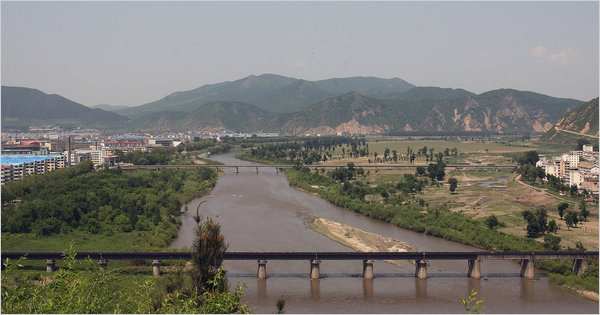
North Korean border with China: guess which side is China's.
NYT story that does the usual with scant interview-based info from recent escapees:
Like many North Koreans, the construction worker lived in penury. His state employer had not paid him for so long that he had forgotten his salary. Indeed, he paid his boss to be listed as a dummy worker so that he could leave his work site. Then he and his wife could scrape out a living selling small bags of detergent on the black market.
It hardly seemed that life could get worse. And then, one Saturday afternoon last November, his sister burst into his apartment in Chongjin with shocking news: the North Korean government had decided to drastically devalue the nation’s currency. The family’s life savings, about $1,560, had been reduced to about $30.
Last month the construction worker sat in a safe house in this bustling northern Chinese city, lamenting years of useless sacrifice. Vegetables for his parents, his wife’s asthma medicine, the navy track suit his 15-year-old daughter craved — all were forsworn on the theory that, even in North Korea, the future was worth saving for.
“Ai!” he exclaimed, cursing between sobs. “How we worked to save that money! Thinking about it makes me go crazy.”
North Koreans are used to struggle and heartbreak. But the Nov. 30 currency devaluation, apparently an attempt to prop up a foundering state-run economy, was for some the worst disaster since a famine that killed hundreds of thousands in the mid-1990s.
Interviews in the past month with eight North Koreans who recently left their country — a prison escapee, illegal traders, people in temporary exile to find work in China, the traveling wife of an official in the ruling Workers’ Party — paint a haunting portrait of desperation inside North Korea, a nation of 24 million people, and of growing resentment toward its erratic leader, Kim Jong-il.
What seems missing — for now, at least — is social instability. Widespread hardship, popular anger over the currency revaluation and growing political uncertainty as Mr. Kim seeks to install his third son as his successor have not hardened into noticeable resistance against the government.
NorKo remains an amazing experiment in pushing captive masses past the limits of human endurance. It is the closest thing to a country-as-concentration-camp as the world has ever seen.